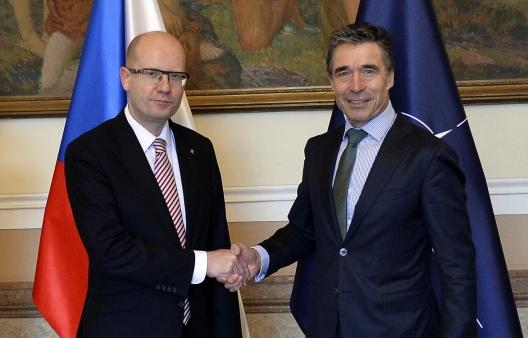 The Czech Republic does not favor hosting foreign NATO troops as part of the alliance’s plans to boost its eastern wing over the Ukraine crisis, its Defense minister said, in sharp contrast to some of its regional peers.
The Czech Republic does not favor hosting foreign NATO troops as part of the alliance’s plans to boost its eastern wing over the Ukraine crisis, its Defense minister said, in sharp contrast to some of its regional peers.
Martin Stropnicky, whose country joined NATO along with Poland and Hungary in 1999, also accused Russia in an interview of waging a “disinformation campaign” in the Czech Republic and elsewhere in Europe over its policies and goals in Ukraine.
NATO’s top military commander, U.S. Air Force General Philip Breedlove, said last week the alliance would have to consider permanently stationing troops in eastern Europe as a result of increased tensions between Russia and Ukraine.
Poland has asked for a permanent NATO presence on its soil and says it is working on practical proposals to be discussed at the alliance’s summit in Wales in September. But Prague, invoking its Cold War history, is much less keen.
Stropnicky said Czechs remained wary of any foreign troop presence as a hangover from the 1968 Soviet invasion of the former Czechoslovakia, even though any NATO forces would only come at the invitation of the Czech authorities.
“We know well how any permanent stationing (of troops) is still a problem. I belong to the generation that experienced the 80,000 Soviet troops based here during the period of (post-1968) ‘normalization’ and it is still a bit of a psychological problem,” Stropnicky told Reuters.
He said he could see some expanded cooperation on training and other activities but not troops. “Raising the alliance’s presence on our territory in various modifications, yes. But when it comes to actual units, I am rather skeptical,” he said. . . .
Czech Defense spending currently stands at 1.08 percent of GDP and domestic political debate has largely focused on preventing any further decline rather than pledging any swift increases in light of the Ukraine crisis.
“There is a certain consensus that a further decline is unthinkable. Now the issue is about defending and negotiating a reasonable gradual increase,” Stropnicky said.
Czech media reported last week that an initial draft budget from the finance ministry envisages a further decline of about 1 percent in military spending next year.
Image: Czech Prime Minister Bohuslav Sobotka and NATO Secretary General Anders Fogh Rasmussen, April 10, 2014 (photo: NATO)
